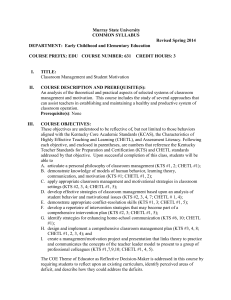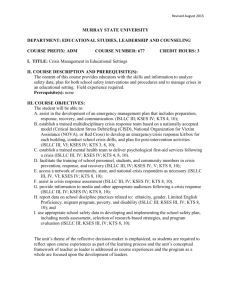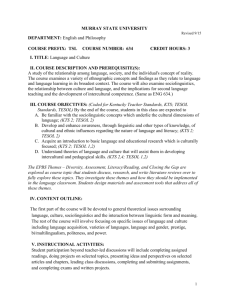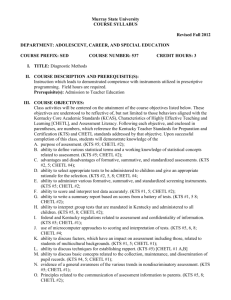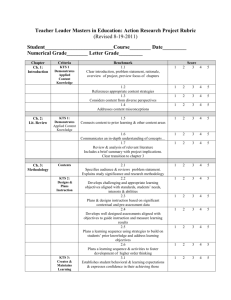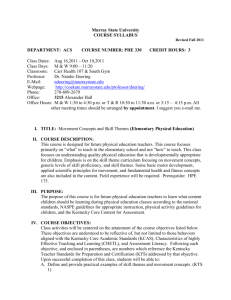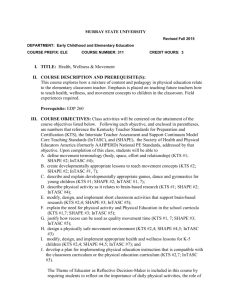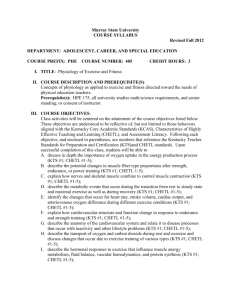Adolescent, Career and Special Education
advertisement
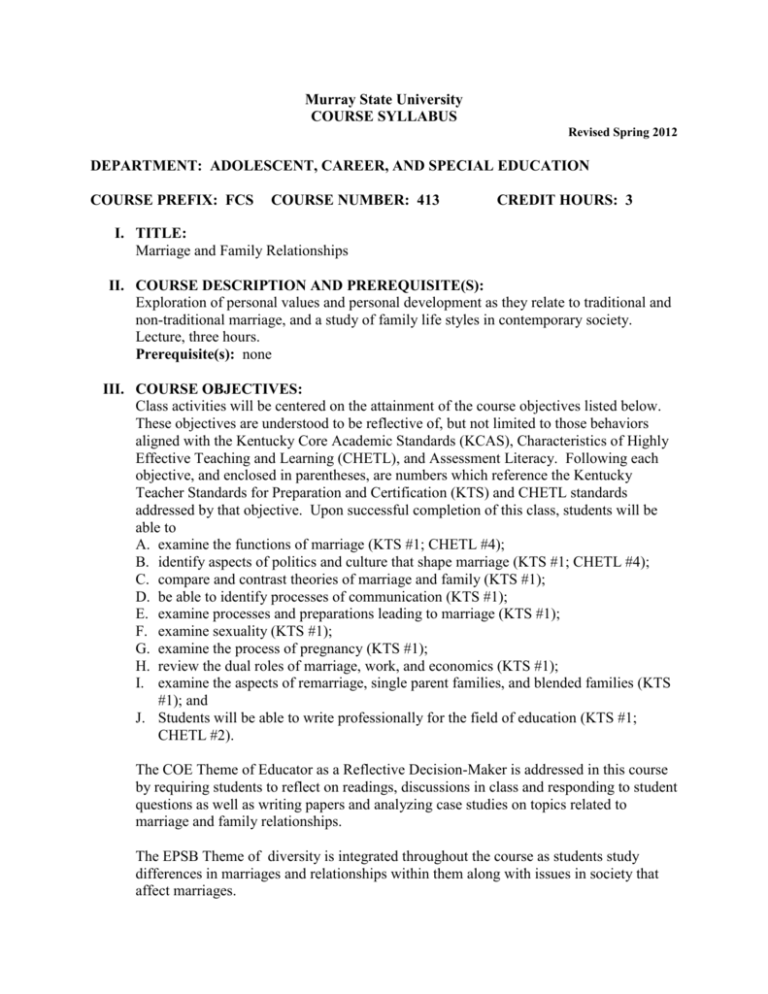
Murray State University COURSE SYLLABUS Revised Spring 2012 DEPARTMENT: ADOLESCENT, CAREER, AND SPECIAL EDUCATION COURSE PREFIX: FCS COURSE NUMBER: 413 CREDIT HOURS: 3 I. TITLE: Marriage and Family Relationships II. COURSE DESCRIPTION AND PREREQUISITE(S): Exploration of personal values and personal development as they relate to traditional and non-traditional marriage, and a study of family life styles in contemporary society. Lecture, three hours. Prerequisite(s): none III. COURSE OBJECTIVES: Class activities will be centered on the attainment of the course objectives listed below. These objectives are understood to be reflective of, but not limited to those behaviors aligned with the Kentucky Core Academic Standards (KCAS), Characteristics of Highly Effective Teaching and Learning (CHETL), and Assessment Literacy. Following each objective, and enclosed in parentheses, are numbers which reference the Kentucky Teacher Standards for Preparation and Certification (KTS) and CHETL standards addressed by that objective. Upon successful completion of this class, students will be able to A. examine the functions of marriage (KTS #1; CHETL #4); B. identify aspects of politics and culture that shape marriage (KTS #1; CHETL #4); C. compare and contrast theories of marriage and family (KTS #1); D. be able to identify processes of communication (KTS #1); E. examine processes and preparations leading to marriage (KTS #1); F. examine sexuality (KTS #1); G. examine the process of pregnancy (KTS #1); H. review the dual roles of marriage, work, and economics (KTS #1); I. examine the aspects of remarriage, single parent families, and blended families (KTS #1); and J. Students will be able to write professionally for the field of education (KTS #1; CHETL #2). The COE Theme of Educator as a Reflective Decision-Maker is addressed in this course by requiring students to reflect on readings, discussions in class and responding to student questions as well as writing papers and analyzing case studies on topics related to marriage and family relationships. The EPSB Theme of diversity is integrated throughout the course as students study differences in marriages and relationships within them along with issues in society that affect marriages. Learned societies from each discipline should be referenced by the preservice/inservice teacher. Kentucky documents, including SB1 Initiatives (e.g., Kentucky Core Academic Standards and Characteristics of Highly Effective Teaching and Learning) will be resources for all teacher candidates. IV. COURSE OUTLINE: A. The Meaning of Marriage and the Family B. Studying Marriage and the Family C. Communication and Conflict Resolution D. Singlehood, Pairing, and Cohabitation E. Understanding Sexuality F. Pregnancy and Parenting G. Marriage, Work, and Economics H. New Beginnings: Single Parent Families, Remarriages, and Blended Families I. Marriage and Family Strengths and Needs J. Senate Bill 1 Initiatives V. INSTRUCTIONAL ACTIVITIES: A. Lecture with supporting materials B. Class Discussions C. Case Studies D. Individual and/or Group Assignments E. Presentations *Other Instructional Activities Will Be Added as Needs Arise VI. FIELD, CLINICAL, AND/OR LABORATORY EXPERIENCES: None VII. TEXT(S) AND RESOURCES: Olson, D., DeFrain, J., & Skogrand, L. (2008). Marriages & families - intimacy, diversity, and strengths. 6th ed. New York, NY: McGraw-Hill A. Handouts B. Videos C. Chapter Study Guides VIII. EVALUATION AND GRADING PROCEDURES: A. Grades will be based on: Midterm Exam Final Exam Individual Project & Presentation Reflection Papers Case Study Interview 1 @ 100 Points 1 @ 100 Points 100 Points 100 Points 100 Points 100 Points 50 Points 50 Points 500 Total Points B. Grading Scale All assignments are due on the assigned dates at the beginning of the class period. Any assignment turned in after the assigned date will receive automatic point deductions. No credit for late assignments after one week. 90-100% = A; 80-89% = B; 70-79% = C; 60-69% = D; 59% or below = E IX. ATTENDANCE POLICY: Students are expected to adhere to the MSU Attendance Policy outlined in the current MSU Bulletin. Class attendance is expected. Students are responsible for all information presented in class including lectures and class discussion, videos, guest speakers, etc. Excessive absences or excessive tardies will result in lowered grades. X. ACADEMIC HONESTY POLICY: Murray State University takes seriously its moral and educational obligation to maintain high standards of academic honesty and ethical behavior. Instructors are expected to evaluate students’ academic achievements accurately, as well as ascertain that work submitted by students is authentic and the result of their own efforts, and consistent with established academic standards. Students are obligated to respect and abide by the basic standards of personal and professional integrity. Violations of Academic Honesty include: Cheating - Intentionally using or attempting to use unauthorized information such as books, notes, study aids, or other electronic, online, or digital devices in any academic exercise; as well as unauthorized communication of information by any means to or from others during any academic exercise. Fabrication and Falsification - Intentional alteration or invention of any information or citation in an academic exercise. Falsification involves changing information whereas fabrication involves inventing or counterfeiting information. Multiple Submission - The submission of substantial portions of the same academic work, including oral reports, for credit more than once without authorization from the instructor. Plagiarism - Intentionally or knowingly representing the words, ideas, creative work, or data of someone else as one’s own in any academic exercise, without due and proper acknowledgement. Instructors should outline their expectations that may go beyond the scope of this policy at the beginning of each course and identify such expectations and restrictions in the course syllabus. When an instructor receives evidence, either directly or indirectly, of academic dishonesty, he or she should investigate the instance. The faculty member should then take appropriate disciplinary action. Disciplinary action may include, but is not limited to the following: 1) Requiring the student(s) to repeat the exercise or do additional related exercise(s). 2) Lowering the grade or failing the student(s) on the particular exercise(s) involved. 3) Lowering the grade or failing the student(s) in the course. If the disciplinary action results in the awarding of a grade of E in the course, the student(s) may not drop the course. Faculty reserve the right to invalidate any exercise or other evaluative measures if substantial evidence exists that the integrity of the exercise has been compromised. Faculty also reserve the right to document in the course syllabi further academic honesty policy elements related to the individual disciplines. A student may appeal the decision of the faculty member with the department chair in writing within five working days. Note: If, at any point in this process, the student alleges that actions have taken place that may be in violation of the Murray State University Non-Discrimination Statement, this process must be suspended and the matter be directed to the Office of Equal Opportunity. Any appeal will be forwarded to the appropriate university committee as determined by the Provost. XI. NON-DISCRIMINATION POLICY STATEMENT: Murray State University endorses the intent of all federal and state laws created to prohibit discrimination. Murray State University does not discriminate on the basis of race, color, national origin, gender, sexual orientation, religion, age, veteran status, or disability in employment, admissions, or other provision of services and provides, upon request, reasonable accommodation including auxiliary aids and services necessary to afford individuals with disabilities equal access to participate in all programs and activities. For more information, contact Sabrina Y. Dial, Director of Equal Opportunity, Murray State University, 103 Wells Hall, Murray, KY 42071-3318. Telephone: 270809-3155 (voice), 270-809-3361 (TDD). XII. FLAG SYSTEM/CONTINUOUS ASSESSMENT: Student progress is continuously assessed throughout the teacher preparation program. Appropriate professional characteristics and dispositions, in addition to academic achievement, are assessed. Positive and negative flags are submitted by faculty to Teacher Education Services and then presented to admissions committees. Negative flags are carefully reviewed to make a determination as to whether a student should be denied admission OR if a professional development plan will be designed for the student’s progress towards program completion. NEGATIVE FLAGS MAY BE GROUNDS FOR DENIAL OF ADMISSION TO TEACHER EDUCATION AND/OR STUDENT TEACHING. Note: The instructor reserves the right to change the format of this course as circumstances of the course demand. FCS 413 Topical Outline Class Date Topics January 14 Introductory Session Explanation of Syllabus Overview of Course January 21 Chapter 1 Chapter 2 January 28 Chapter 3 February 4 Chapter 4 February 11 Chapter 5 Project Presentations February 18 Chapter 6 Project Presentations February 25 Chapter 7 Review for Mid Term Examination March 4 Mid Term Examination March 11 Chapter 8 March 18 Chapter 9 March 25 Chapter 10 Project Presentations April 1 Chapter 11 Project Presentations April 8 Chapter 12 Case Study April 15 Chapter 13 Project Presentations April 22 Chapter 14 April 29 Chapter 15 Review for Final Examination May 6 Final Examination **This schedule may change as classroom needs arise.
